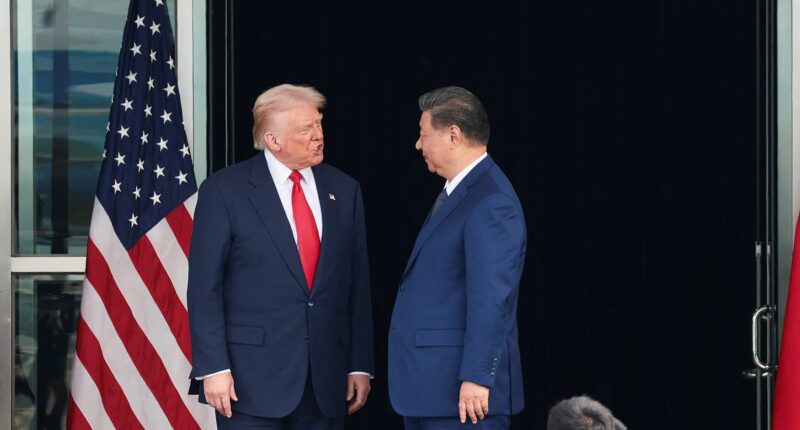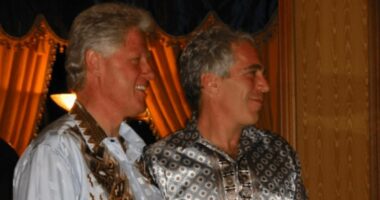Share this @internewscast.com

In a significant diplomatic development, Donald Trump and Chinese President Xi Jinping have reached an agreement during their first meeting in six years, held in Busan, South Korea on Thursday. This meeting comes amidst a heated trade conflict initiated by Trump earlier this year, which resulted in Chinese imports to the United States surging by 57 percent. Following their historic discussion, Trump announced aboard Air Force One that he had reduced China’s tariff obligations by 10 percent. This decision was made in anticipation of Xi’s commitment to curb the influx of dangerous drugs into the U.S. “On fentanyl, we agreed he would work diligently to halt its flow,” Trump conveyed during his return flight. “I believe we’ll see substantial efforts made.”

The tariff reduction, Trump stated, would take effect immediately. “I trust he’s going to make a significant effort to end the fatalities caused by these substances,” he added. Prior to their private meeting, Xi acknowledged the existing “frictions” between the two nations, while Trump humorously referred to Xi as a “tough negotiator.” Their handshake marked the first direct interaction since Trump reignited a trade war with China soon after resuming office by imposing an additional 10 percent tariff on imports. “We have a deal,” Trump declared, highlighting the resolution of a contentious issue related to rare earth minerals, and asserting, “There’s no roadblock at all on rare earth.”

Xi’s strong bargaining position at the meeting stemmed from China’s dominance in producing 80 to 90 percent of the world’s rare earth minerals, which are crucial for the U.S. tech sector. Trump also mentioned plans to visit China in April, with Xi expected to return the visit to either Palm Beach or Washington, D.C. subsequently. “On a scale from zero to 10, with 10 being the best, I would rate the meeting as a 12,” Trump praised at the conclusion of his weeklong Asian tour. The discussions, which lasted less than two hours, held high stakes for both countries, with both leaders maintaining a cordial yet cautious demeanor. “Given our distinct national circumstances, it’s normal for the world’s leading economies to experience occasional disagreements,” Xi remarked as they commenced negotiations at an air base in Busan, South Korea.

And Trump insisted: ‘We’ve already agreed to a lot of things and we’ll agree to some more right now.’ Trump needs a political win on the foreign stage after his peace deal between Israel and Hamas began to fall apart and talks for a ceasefire between Ukraine and Russia hit a standstill this month. The president blasted off a social media post just moments before his consequential meeting with Xi announcing his direction for the Department of War to begin nuclear weapon testing ‘immediately.’ He specifically called out needing to meet the level of testing made by Russia and China. And while Trump relies on flattery to build relationships with adversarial world leaders, he also had a quick quip for Xi right after they shook hands. ‘I think he’s a very tough negotiator. That’s not good,’ he chuckled. Trump added: ‘We’ll have a great understanding. We have a good relationship.’

Meanwhile, Xi called their relationship ‘warm.’ ‘Since your reelection we have spoken on the phone three times, exchanged several letters and stayed in close contact,’ he said, according to a live translation of his short remarks. ‘You and I, at the helm of U.S.-China relations, should stay the right course,’ Xi insisted. After and hour-and-40-minute meeting, the two world leaders and their delegations emerged from the building in Busan, shook hands and Trump leaned in to say something to Xi before they parted ways. The two did not make any public remarks after their bilateral sit-down.

The president has been highly critical of Xi in his second term and went to his social media site Truth Social to link the Chinese leader to Russian President Vladimir Putin and North Korean autocrat Kim Jong Un. But Xi arrived at the meeting with a powerful negotiating hand given China produces 80 to 90 percent of the world’s rare earth minerals, which are essential for America’s high-tech industry. The US has now discovered Beijing can survive without its farmers’ soybeans since they can import from South America instead, Trump realizes that his country cannot thrive technology-wise without the rare earths from China.

Trump and Xi agreed to meet on the Gimhae South Korean Air Base sitting at the edge of the Gimhae International Airport. Among Trump’s team attending the high-stakes meeting in Busan are Chief of Staff Susie Wiles, Secretary of State Marco Rubio, Secretary of Treasury Scott Bessent, Secretary of Commerce Howard Lutnick, Homeland Security Advisor Stephen Miller and Trade Advisor Jamieson Greer. The president jetted off last week for a weeklong trip through Asia – starting in Malaysia, then to Japan and finishing off in South Korea with his Xi meeting.









